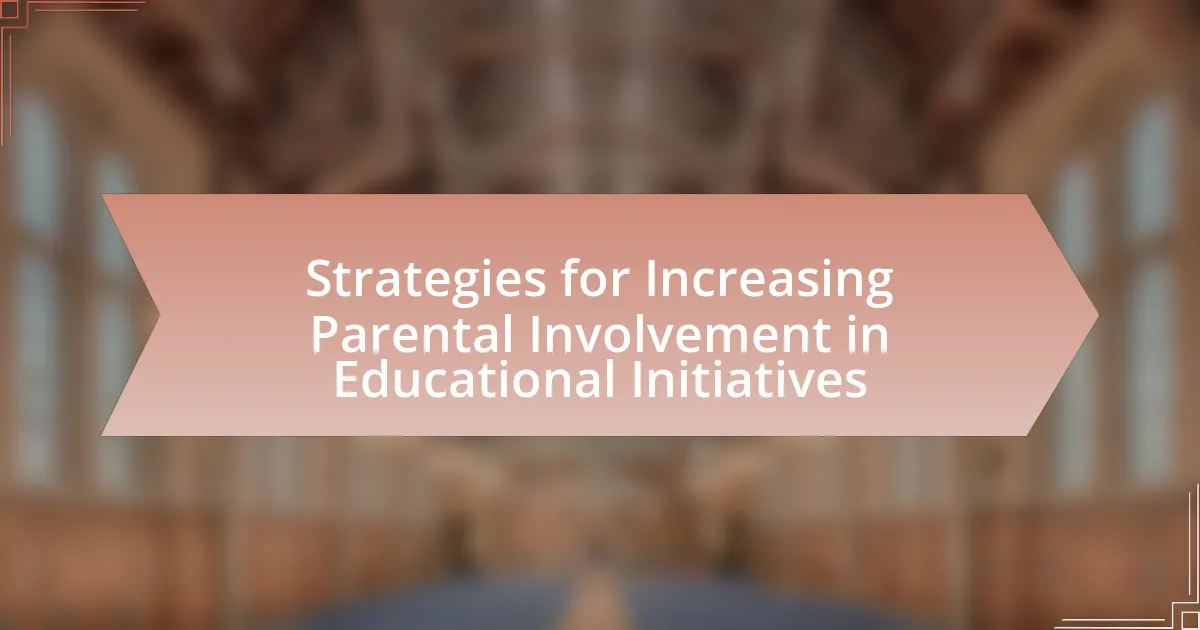The article focuses on strategies for increasing parental involvement in educational initiatives, emphasizing the importance of effective communication, flexible engagement opportunities, and a welcoming school environment. Key methods include utilizing direct communication channels, offering workshops, and fostering partnerships with community organizations to enhance parental engagement. The article also discusses the impact of parental involvement on student achievement, school culture, and community relationships, while addressing challenges such as time constraints and communication barriers. Additionally, it outlines best practices for schools to implement successful initiatives that promote active participation from parents, ultimately contributing to improved educational outcomes for students.

What are the key strategies for increasing parental involvement in educational initiatives?
Key strategies for increasing parental involvement in educational initiatives include establishing effective communication channels, providing flexible engagement opportunities, and fostering a welcoming school environment. Effective communication, such as regular updates through newsletters or parent-teacher meetings, ensures parents are informed and engaged in their child’s education. Flexible engagement opportunities, like varied meeting times and virtual participation options, accommodate diverse schedules and increase attendance. A welcoming school environment, characterized by inclusive events and approachable staff, encourages parents to participate actively. Research indicates that schools with strong parental involvement see improved student performance and higher attendance rates, highlighting the importance of these strategies.
How can schools effectively engage parents in their children’s education?
Schools can effectively engage parents in their children’s education by implementing regular communication strategies, such as newsletters, parent-teacher conferences, and digital platforms for updates. Research indicates that consistent communication fosters a collaborative environment, leading to improved student outcomes. For instance, a study by the Harvard Family Research Project found that schools with strong family engagement practices saw a 20% increase in student achievement. Additionally, schools can offer workshops and resources that empower parents to support their children’s learning at home, further enhancing parental involvement and educational success.
What communication methods are most effective for reaching parents?
Effective communication methods for reaching parents include direct phone calls, text messaging, and email newsletters. Research indicates that direct phone calls foster personal connections and allow for immediate feedback, while text messaging offers convenience and quick updates, with studies showing that 90% of text messages are read within three minutes. Email newsletters provide a structured way to share detailed information and resources, with a 20% average open rate in educational contexts, indicating their effectiveness in reaching parents. These methods collectively enhance engagement and ensure that parents receive timely and relevant information regarding their children’s education.
How can schools create a welcoming environment for parents?
Schools can create a welcoming environment for parents by fostering open communication and providing accessible resources. Establishing regular channels for dialogue, such as parent-teacher conferences and feedback surveys, encourages parents to engage with the school community. Additionally, schools can offer workshops and informational sessions that address parents’ needs and concerns, making them feel valued and included. Research indicates that schools with strong parental engagement see improved student outcomes, highlighting the importance of creating an inviting atmosphere for parents.
What role do community resources play in enhancing parental involvement?
Community resources significantly enhance parental involvement by providing support, information, and opportunities for engagement in educational initiatives. These resources, such as local organizations, workshops, and support groups, facilitate communication between parents and schools, fostering a collaborative environment. For instance, research indicates that schools with active partnerships with community organizations see a 20% increase in parental participation in school events and activities. This collaboration not only empowers parents with knowledge about their children’s education but also creates a network of support that encourages sustained involvement.
How can partnerships with local organizations support parental engagement?
Partnerships with local organizations can significantly enhance parental engagement by providing resources, support, and opportunities for collaboration. These organizations often have established connections within the community, enabling them to facilitate workshops, events, and programs that encourage parents to participate in their children’s education. For instance, research shows that schools collaborating with local nonprofits can increase parental involvement by up to 30%, as these partnerships create a network of support that addresses barriers to engagement, such as language differences or lack of transportation. Additionally, local organizations can offer training and resources that empower parents with skills and knowledge, further fostering their active participation in educational initiatives.
What resources are available to assist parents in supporting their children’s education?
Parents can access various resources to support their children’s education, including educational websites, community programs, and school resources. Websites like Khan Academy and PBS LearningMedia offer free online courses and materials tailored to different age groups and subjects. Community programs, such as local libraries and after-school tutoring services, provide additional learning opportunities and support. Schools often have parent-teacher associations and workshops that equip parents with strategies to engage in their children’s learning effectively. These resources collectively enhance parental involvement, which research shows is linked to improved student performance and engagement in school.

Why is parental involvement crucial for educational success?
Parental involvement is crucial for educational success because it significantly enhances student achievement and engagement. Research indicates that students with involved parents are more likely to earn higher grades, have better attendance, and exhibit positive behavior in school. For instance, a study by the National Center for Family & Community Connections with Schools found that parental engagement can lead to a 30% increase in student academic performance. This involvement fosters a supportive learning environment, encourages motivation, and reinforces the value of education, ultimately contributing to better educational outcomes.
What impact does parental involvement have on student achievement?
Parental involvement significantly enhances student achievement. Research indicates that students with engaged parents tend to have higher grades, better attendance, and increased motivation. A study by the National Center for Family & Community Connections with Schools found that parental involvement can lead to a 30% increase in student performance. Furthermore, active participation from parents fosters a supportive learning environment, which is crucial for academic success.
How does parental engagement influence a child’s motivation and attitude towards learning?
Parental engagement significantly enhances a child’s motivation and attitude towards learning by fostering a supportive and encouraging environment. When parents actively participate in their child’s education, such as helping with homework or attending school events, children are more likely to develop a positive attitude towards learning. Research indicates that children whose parents are involved in their education tend to have higher academic achievement, better attendance, and increased motivation. For instance, a study published in the “Journal of Educational Psychology” by Fan and Chen (2001) found that parental involvement is positively correlated with students’ academic performance and motivation levels. This correlation underscores the critical role that engaged parents play in shaping their children’s educational experiences and attitudes.
What evidence supports the correlation between parental involvement and academic performance?
Research consistently shows a positive correlation between parental involvement and academic performance. Studies indicate that students with engaged parents tend to achieve higher grades, have better attendance, and exhibit improved behavior in school. For instance, a meta-analysis conducted by Jeynes (2016) found that parental involvement significantly enhances student achievement across various demographics, with effect sizes ranging from 0.24 to 0.60, indicating a meaningful impact. Furthermore, the National Center for Education Statistics reported that students whose parents are actively involved in their education are more likely to complete homework and participate in school activities, further supporting the link between parental engagement and academic success.
How does parental involvement affect school culture and community relationships?
Parental involvement significantly enhances school culture and strengthens community relationships. When parents actively participate in school activities, it fosters a sense of belonging and collaboration among students, teachers, and families, leading to a positive school environment. Research indicates that schools with high levels of parental engagement report improved student achievement, better attendance, and increased motivation among students. For instance, a study by the Harvard Family Research Project found that students whose parents are involved in their education are more likely to earn higher grades and have better social skills. This involvement also cultivates trust and communication between schools and families, creating a supportive community network that benefits all stakeholders.
What are the long-term benefits of fostering strong school-parent partnerships?
Fostering strong school-parent partnerships leads to improved student outcomes, including higher academic achievement and better social skills. Research indicates that students whose parents are actively involved in their education tend to have better grades, higher test scores, and increased graduation rates. For instance, a study by the National Education Association found that students with engaged parents are 30% more likely to earn higher grades and 20% more likely to graduate than their peers. Additionally, these partnerships promote a positive school climate, enhance communication between families and educators, and foster a sense of community, which contributes to long-term educational success and student well-being.
How can increased parental involvement contribute to a positive school climate?
Increased parental involvement contributes to a positive school climate by fostering stronger relationships between families and schools, which enhances student engagement and academic performance. Research indicates that when parents actively participate in school activities, such as volunteering or attending meetings, students are more likely to feel supported and motivated, leading to improved behavior and attendance. A study by the National Center for Family & Community Connections with Schools found that schools with high levels of parental involvement report better student outcomes, including higher grades and lower dropout rates. This collaborative environment not only benefits students but also creates a sense of community and shared responsibility among parents, educators, and school staff, further reinforcing a positive school climate.

What challenges do schools face in promoting parental involvement?
Schools face several challenges in promoting parental involvement, including time constraints, communication barriers, and differing cultural expectations. Time constraints arise as many parents juggle work and family responsibilities, limiting their availability for school events or meetings. Communication barriers often stem from language differences or lack of effective outreach strategies, making it difficult for schools to engage all parents. Additionally, cultural expectations can vary significantly, leading to misunderstandings about the role of parents in education. These challenges hinder the ability of schools to foster meaningful partnerships with families, which are essential for student success.
What barriers prevent parents from engaging in educational initiatives?
Barriers that prevent parents from engaging in educational initiatives include time constraints, lack of awareness, and socioeconomic factors. Time constraints arise from parents’ work commitments and family responsibilities, limiting their availability to participate in school activities. Lack of awareness refers to insufficient information about available educational initiatives, which can lead to disengagement. Socioeconomic factors, such as financial instability or lack of access to transportation, further hinder parents’ ability to engage. Research indicates that these barriers significantly impact parental involvement, as evidenced by a study published in the “Journal of Educational Psychology,” which found that parents facing these challenges are less likely to participate in school events and initiatives.
How can schools address issues of accessibility and communication with parents?
Schools can address issues of accessibility and communication with parents by implementing multiple strategies, such as utilizing technology, providing multilingual resources, and hosting regular informational sessions. For instance, schools can adopt platforms like mobile apps or websites that allow parents to access important information and communicate with teachers easily. Research indicates that schools using digital communication tools see a 30% increase in parental engagement (Henderson & Mapp, 2002). Additionally, offering materials in various languages ensures that non-English speaking parents can understand school communications, thereby fostering inclusivity. Regular informational sessions, both in-person and virtual, can also facilitate open dialogue between parents and school staff, enhancing transparency and trust.
What strategies can be implemented to overcome cultural and socioeconomic barriers?
To overcome cultural and socioeconomic barriers in increasing parental involvement in educational initiatives, schools can implement targeted outreach programs that engage families through culturally relevant communication and support services. These programs can include multilingual resources, community liaisons who understand the cultural context, and workshops that address specific needs of diverse families. Research indicates that schools employing such strategies see improved participation rates; for instance, a study by the Harvard Family Research Project found that effective communication and culturally responsive practices significantly enhance parental engagement in education.
How can schools measure the effectiveness of their parental involvement strategies?
Schools can measure the effectiveness of their parental involvement strategies through surveys, academic performance metrics, and attendance records. Surveys can assess parents’ perceptions of involvement opportunities and their engagement levels, providing direct feedback on the strategies implemented. Academic performance metrics, such as student grades and standardized test scores, can indicate the impact of parental involvement on student success. Additionally, analyzing attendance records for school events can reveal the level of parental participation, which correlates with the effectiveness of the strategies employed. Research shows that schools with higher parental involvement often see improved student outcomes, reinforcing the importance of these measurement methods.
What metrics can be used to assess parental engagement levels?
Metrics used to assess parental engagement levels include attendance at school events, frequency of communication between parents and teachers, participation in parent-teacher conferences, and involvement in school decision-making processes. These metrics provide quantifiable data that reflects the extent of parental involvement in their children’s education. For instance, research indicates that higher attendance rates at school events correlate with increased student achievement, demonstrating the impact of parental engagement on educational outcomes. Additionally, surveys measuring parental satisfaction and feedback on school initiatives can further gauge engagement levels, providing insights into areas for improvement in fostering parental involvement.
How can feedback from parents inform future initiatives?
Feedback from parents can inform future initiatives by providing insights into their children’s needs and preferences, which can guide the development of more effective educational programs. For instance, surveys conducted by educational institutions often reveal specific areas where parents feel improvements are necessary, such as communication methods or curriculum content. Research indicates that schools that actively seek and incorporate parental feedback see increased satisfaction and engagement, leading to better student outcomes. A study published in the “Journal of Educational Psychology” found that parental involvement, influenced by their feedback, significantly enhances student achievement and school performance.
What are some best practices for fostering parental involvement in education?
Best practices for fostering parental involvement in education include establishing clear communication channels, creating welcoming school environments, and providing opportunities for parents to engage in school activities. Clear communication, such as regular newsletters and parent-teacher conferences, ensures parents are informed about their child’s progress and school events. A welcoming environment encourages parents to participate by making them feel valued and respected. Additionally, schools can offer workshops and volunteer opportunities that empower parents to contribute to their child’s education, which has been shown to enhance student achievement and foster a supportive community. Research indicates that schools with high levels of parental involvement see improved student performance and increased attendance rates.
How can schools implement successful workshops and training for parents?
Schools can implement successful workshops and training for parents by identifying specific needs through surveys and feedback, then designing targeted programs that address those needs. For instance, a study by the Harvard Family Research Project indicates that workshops focusing on academic support strategies can significantly enhance parental engagement. Schools should also ensure accessibility by offering sessions at various times and providing childcare, which has been shown to increase attendance rates. Additionally, collaborating with community organizations can provide resources and expertise, further enriching the training experience.
What role do volunteer opportunities play in increasing parental engagement?
Volunteer opportunities significantly enhance parental engagement by providing parents with direct involvement in their children’s educational environment. When parents participate in school activities, they develop a stronger connection to the school community, which fosters communication and collaboration between educators and families. Research indicates that schools with active volunteer programs report higher levels of parental involvement, leading to improved student outcomes. For instance, a study published in the “Journal of Educational Psychology” found that increased parental participation through volunteering correlates with higher academic achievement and better social skills among students. This evidence underscores the critical role that volunteer opportunities play in promoting parental engagement in educational initiatives.


